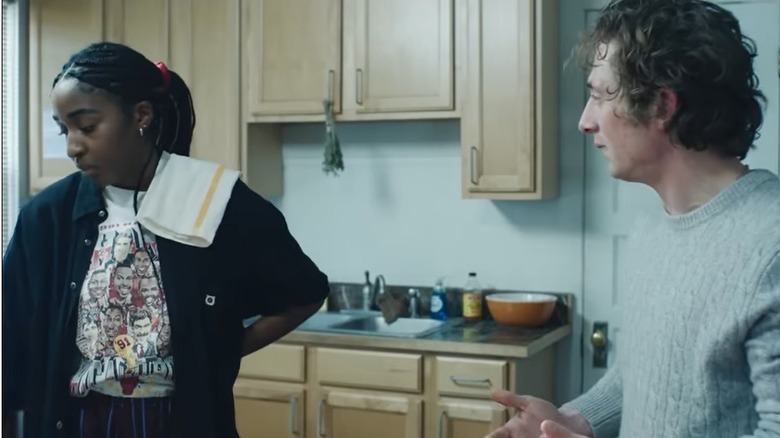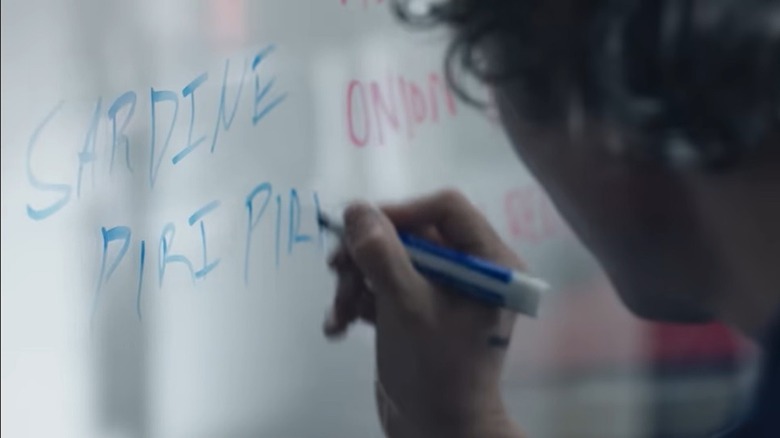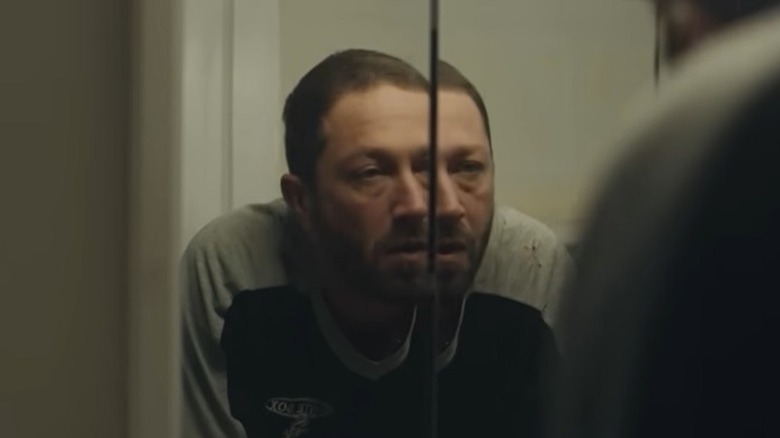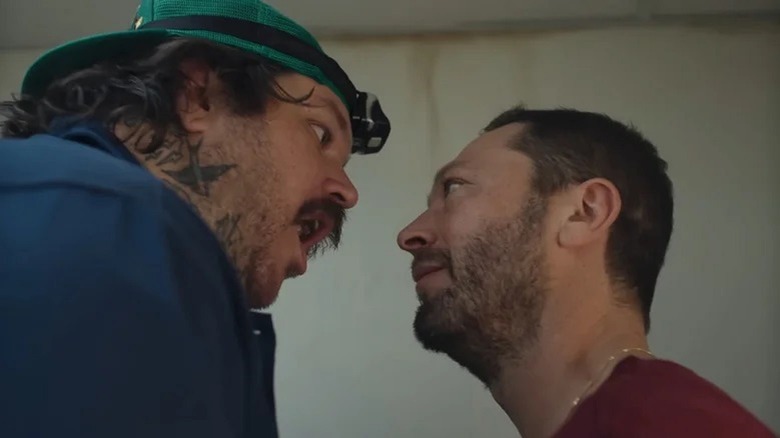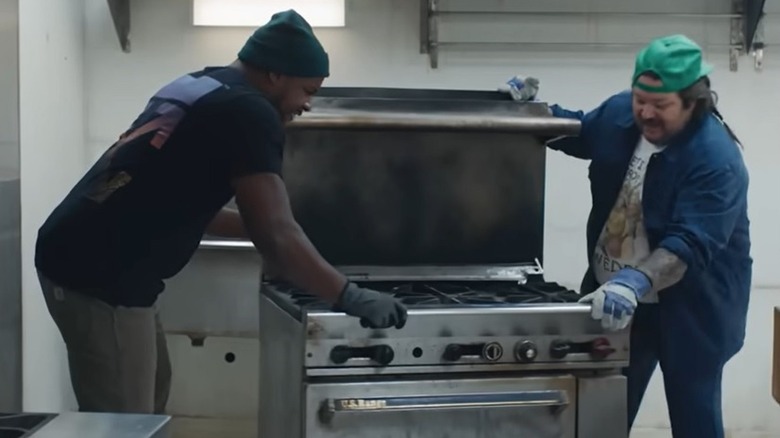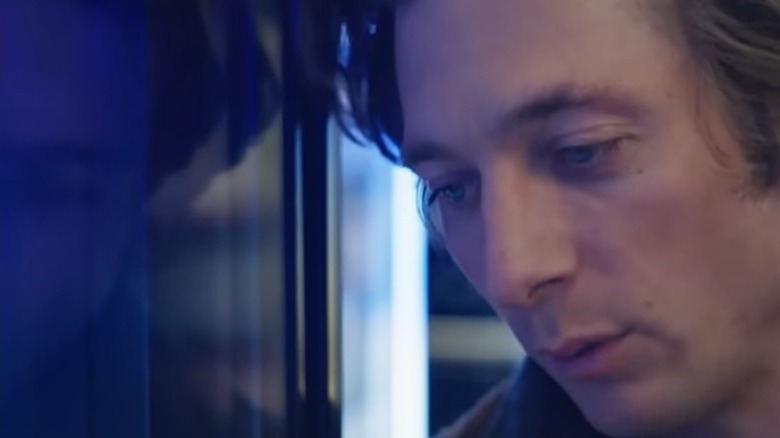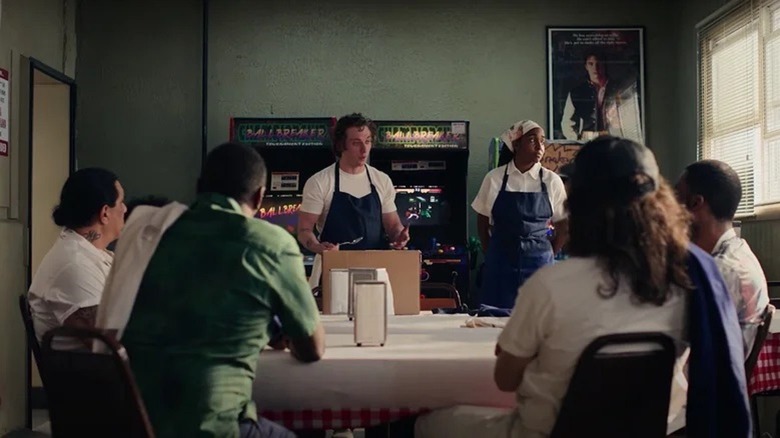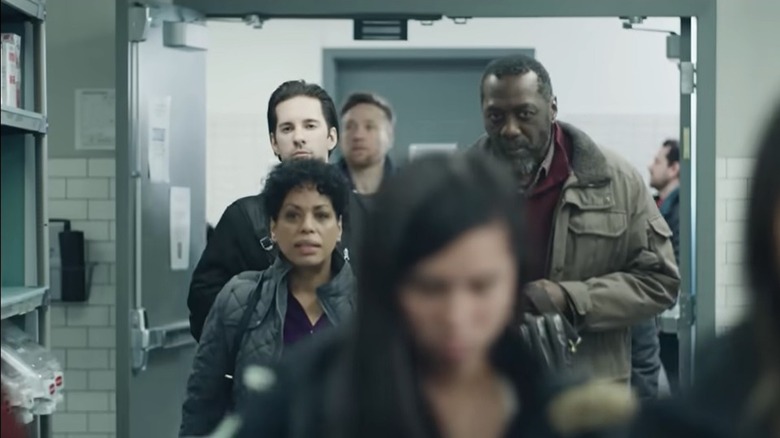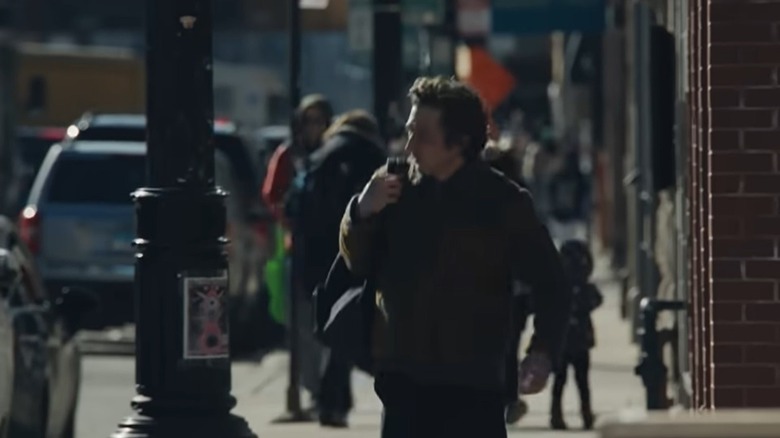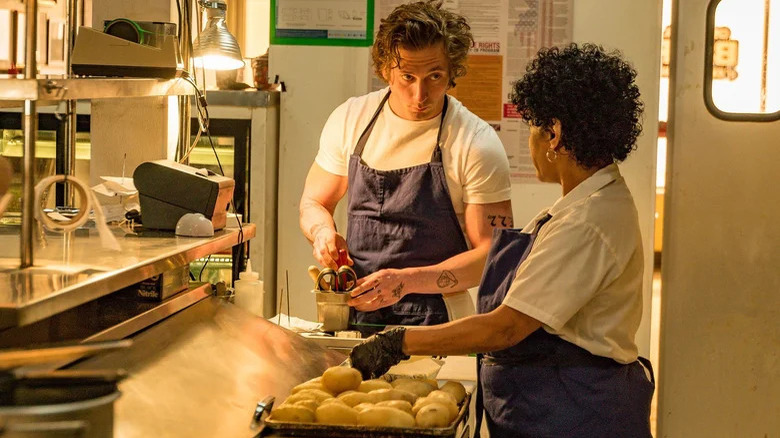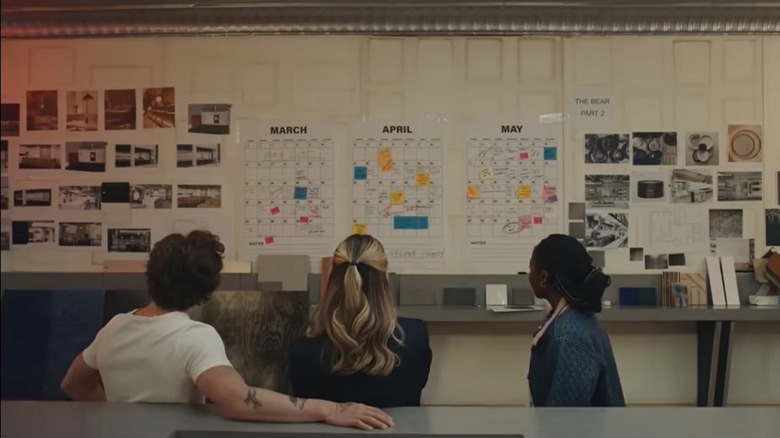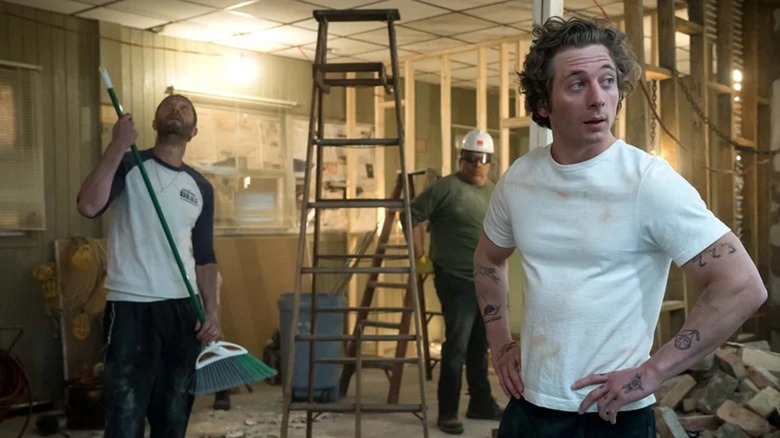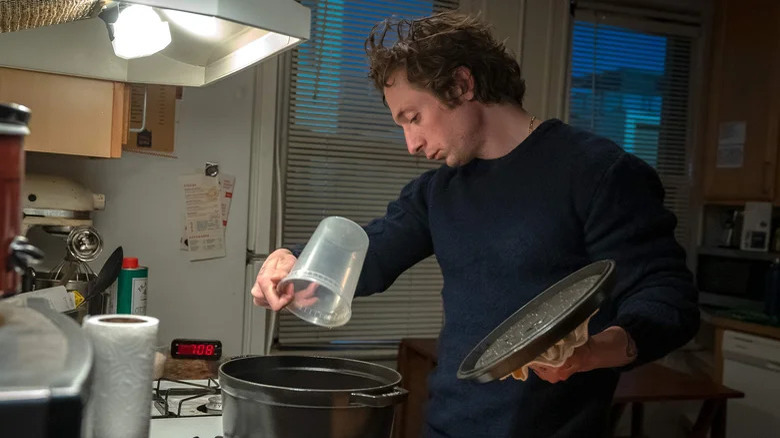The Bear Season 2 Expands On The Growing Dictionary Of Restaurant Slang
If you've watched even a single episode of FX's award-winning series "The Bear," you've likely picked up on the liberal use of chef speak among the characters. With season 2 dropping for excited fans ready for another round, there's even more kitchen lingo making the rounds as Carmen Berzatto and family build their dream restaurant. As the reinvention of "The Bear" comes to life, the buzzwords buzz ever louder in a frenzy of culinary activity tense enough to make Gordon Ramsay turn in his apron and make a run for the swinging doors.
Though the terminology becomes more regularly used among the characters, "The Bear" didn't originate the vernacular chefs use as part of their daily work, of course. Chef's Resources provides a glossary of terms you may pick up on as you binge your way through an excellent 10-episode second season. Our ears caught several repeated terms and a few key one-offs that felt significant enough for a deep dive. For anyone hungry to be in the know, we're serving up our best translations of this gourmet dining dialect. As the Berzattos are prone to saying when it's time to get on with the show, let it rip.
Yes, Chef and I'm sorry in ESL (various episodes)
Some of the slang being slung by the Bear gang is pretty self-explanatory, like the ever-present "Yes, Chef." This honorific is a term of respect used among kitchen staff in an almost militaristic way to affirm that instructions have been heard and will be followed. In season 2, viewers see the title given to non-chef members of the team; by the final episode, everyone on the restaurant staff refers to one another as Chef, which makes for a charming elevation of the title to remind us that, in the kitchen, everyone is equally important.
In non-chef speak, Carmy introduces a linguistic twist that will become crucial as the new restaurant moves forward and stress builds among the team. While working with Sydney on the new menu, he rubs his fist in circles against his chest, the ASL sign for "I'm sorry" (per Signing Savvy). It's a visual apology learned from his previous chefs, a tension-cutter used when team members disagreed during food service, to let them know that they could discuss it later. It becomes a moving way for this formed family to say sorry when the heat is on.
Chaos Menu (Episode 2)
Introduced in the second episode and referenced across the entire season, Carmy and Sydney have opted for a chaos menu for the new restaurant. This refers to chaos cooking, a type of fusion cuisine that merge different tastes and textures in an exciting, eclectic line-up. The duo labor valiantly over each of the nine courses, designing a flavor for each dish that maximizes creativity and individuality. There's no single cultural cuisine or culinary movement represented. The chefs let their unfettered imaginations combine to conjure a unique line-up in which each recipe is the star of the show. It's an exciting and artful way for these talented creators to express their full passion for the food they prepare in their quest for the coveted Michelin star.
Not coincidentally, "chaos menu" becomes shorthand throughout the season for the savage undertaking of putting the new restaurant together. Originally conceived as a simple upgrade, structural issues force "The Bear" out of its den, requiring full-blown renovations and sending both the schedule and the crew spinning out of control. The labor of getting the new place ready on time turns out to be as tumultuous as the menu it's destined to serve.
Drop a Check and Stage (Episode 7)
The culture of fine dining is a new animal to many in the Bear gang. Episode 7 sees Richie spending a week at Carmy's old restaurant as a stage (pronounced "stahj") to learn the difference between the greasy dive that "The Bear" used to be and the gleaming jewel the new iteration will become. Per Michelin Guide, a stage is an intern-style team member on deck to shadow the crew and learn how a gourmet kitchen is run. Richie starts out as a stage with a sizable chip on his shoulder, polishing forks and feeling resentful. By the end of the episode, he's developed a keen eye for how to make memorable moments for diners as well as for himself. As he learns, every second counts.
In this episode, hospitality is the main ingredient, a phenomenon Richie takes great notice of as the week unfolds. The house expresses this superior consideration of their guests by choosing not to "drop a check" on any table. This is a kicky phrase that simply means delivering a bill to a diner's table, and refusing to do it is an act of gratitude that makes a lasting impression.
Take the temperature of the room (Episode 7)
During his quick tenure as a stage, Richie comes to understand the importance of providing superior service in a high-end dining experience. Every guest is made to feel as if they're a VIP, no matter how many guests are being served. He learns the value of being able to "take the temperature of the room," a colorful phrase that means gauging the mood of the diners. It's a concerted effort among the staff that requires precise attention to detail and the ability to improvise. In a pinnacle example, when a staff member overhears a guest mention that she's never had Chicago pizza, the crew surprises her by sending Richie on a speedy quest for a deep-dish pie from Pequod's. The head chef quickly reconfigures the pie for gourmet presentation, dazzling the guests by offering such immaculate and thoughtful service.
Being able to take the temperature of the room serves Richie well later in the season, when he steps into his role as the new restaurant's concierge. He's able to move from table to table with ease, turning on his considerable charm and giving every table special consideration. As Richie learns, we learn too.
Corner and Behind (Episode 7)
Havoc in the kitchen means communication is vital, especially when it comes to avoiding injury. No matter who passes through the workspace, it's crucial to make their presence known to any and everyone who might cross their path. In season 2, we hear a call-and-response chorus of "corner" and "behind" coming not only from the kitchen when it's in motion, but from the construction crew as they move frantically to get the place ready as rapidly as possible. These two terms are very direct ways to let everyone in the space know that you are either coming around a corner or passing behind them. This outcry is the most direct way to locate yourself when cruising through a disorderly room where fire and knives are in use on all fronts. The sounds punctuate scenes where the action ramps up, helping viewers feel immersed in the frenzy.
The added caution is well-earned this season. A memorable scene from season 1 saw Richie taking a knife to his hind region when Sydney turned too tightly in the narrow kitchen space. Considering the animosity between the characters, there may have been no call-out that could have prevented the bloodshed.
Front of House and Starcatcher (Episode 8)
The importance of service becomes even more imperative in episode 8, with friends and family night fast approaching. Richie and Nat interview staff members for "front of house," meaning the customer-facing side of a restaurant, only to discover how good help really is hard to find. While Nat is looking for prior experience in a candidate, Richie is more focused on the attention to detail offered by potential team members. He reminds Nat that if Michelin stars are the goal for the restaurant, then they should be looking for a "star catcher," a team member who helps the restaurant earn its prestige.
This may not be entirely necessary in the real world. For viewers unfamiliar with what qualifies a restaurant for a Michelin star, the Michelin site explains that stars are awarded on food quality only, and that service isn't a consideration in the judging. So while Richie's requirements for top-tier customer experience are admirable overall, the real star catchers will be found in the kitchen, not the dining room. Good thing "The Bear" has a couple of culinary creatives with superior gastronomical vision working on the new menu.
Let's Hold and Let's Push (Episode 10)
Even when a kitchen is running like a well-oiled machine, it can be challenging to get the timing right. Dishes go wrong, food gets cold, and guests fail to make their reservations. Whether the clock is ticking fast or slow, it's important for the crew to be flexible. This season of "The Bear" illustrates this ebb and flow with the phrases "let's hold" and "let's push." These straightforward yet clipped terms mean pulling back on the orders for the moment or pushing forward to get the finished dishes out to diners. It's a back-and-forth that plays out in real time in episode 10, when Sydney takes on the order desk. She controls the kitchen like a symphony conductor, calling out instructions for new needs while keeping a close eye on existing orders. The culinary orchestra hums under her confident control, holding and pushing as necessary.
Of course, even an orchestra can hit sour notes, and a kitchen is only as precise as the crew that executes it. When Carmy gets locked in the walk-in fridge, the push-and-hold ramps up as roles shift and the stress mounts. Let's hold, indeed.
We're Up and Pick Up (Episode 10)
By the time friends and family soft-launch arrives, we have a good sense of what "The Bear" staff is talking about when they holler out their quirky, quick phrases. With a dining room full of hungry patrons to impress, the food line is moving and the crisp kitchen slang is flowing. Dishes that need delivery to the table are flagged as "pick up," an obvious term that even a gourmet n00b can catch onto. "We're up" is similar and used interchangeably, which designates "up" as a word that means it's time to move from prep to serving.
By now, there's a discernible sequence to the chef-speak that viewers can begin to pick up on as more than just mere chatter. Holding and pushing gets a dish to where it needs to be while picking up takes it to where it needs to go next. We start to see the mechanics of a functioning kitchen as less an assembly line and more of an improvised dance, with instructions called and the choreographer designating which move comes next. It may seem that they're making it up as they go, but everyone knows the steps.
Fire and Refire (Episode 10)
There's no way to control every aspect of food production, no matter how skilled the team is. When a dish is ready to go in the oven, the Bear crew signals that it's ready for "fire," meaning the only thing needed now is heat to make the food edible. Similarly, a dish in need of a warm-up is announced with a brisk "we need a refire." The pacing of episode 10 is so hurried, hearing these phrases ring out among the other lingo helps viewers develop an ear for kitchen slang. With so much terse terminology passing through the season 2 dialogue, it would be difficult to not start using these terms during your own home cooking adventures.
By this time in the season, it's clear that quick communication is best in a kitchen. "The Bear" pack does an excellent job of showing how fast-moving the energy behind the swinging doors can be, and on a constant basis. Once the restaurant is open for business, it's a rush of activity from start to finish, with no room for extra language. With shorthand speak that everyone understands, it's easy to shift gears using very few words.
Walking and All Day (Episode 10)
"Walking" may be the simplest kitchen term used in the second season of "The Bear." This means food is moving from the kitchen to the dining room and is usually followed by a table number to identify the recipient. When Richie takes over the ticket station, food is either being fired, retired, or walking, with very little in between. It's a hopping, happening occasion with motion coming in every direction. There's so much activity behind the scenes in this episode, walking may be the understatement of the season. But once the food leaves the kitchen, it's all serenity, and walking is the order of the day.
Another phrase heard in the prep stations is "all day," referring to the total number of a particular item on a menu needed at a given moment. Richie calls out "all day" to let the chefs know to line up a series of selections so they can be prepped in a single go. This lets episode 10 shows viewers the constant and continuous the activity behind the stove. Shortening order requests with phrases like "all day" sets a rhythm the crew can tune into as they separate signal from noise.
Dead Food and Hands Please (Episode 10)
There's bound to be food that can't be served to customers, the unfortunate result of a too-busy kitchen where things get forgotten until it's too late. In these instances, the chef calls out "dead food" to alert the team that the dishes are unservable and need to be recreated. It's a kink in the hose that's sure to cause frustration among the crew and something that should be called out as soon as possible. Fortunately, the Bear bunch are able to avoid too much dead food during their initial foray.
Another easily understood term is "hands please." When a dish is finished and ready to be walked to a table, the chef calls it out for available staff to come quickly and make the delivery. It's a simple way to end the prep process and signal that all the work is about to pay off. In episode 10, when Carmy gets locked in the walk-in fridge, everyone on staff is now open to the "hands please" call to keep things in motion. It's a complication that takes the gang by surprise. But once they have a handle on things, it's all hands-please on deck.
In the Weeds and Heard (Episode 10)
If you've ever thought cooking was relaxing and that it might be fun to become a professional chef, watching episode 10 may change your mind. As the friends and family evening unfolds, activity picks up, and the crew makes reference to being "in the weeds." This colorful phrase is an alternative way to say we are super-busy in a way that requires everyone's full attention. When kitchen staff hear this, they know it's mission-critical to stay on point and keep focused. To make sure everyone is on the same page, a team member can call out "heard" to alert the team that an instruction has been received and is in motion.
What this episode does exceptionally well is drawing the contrast between the fiery activity in the kitchen and the serene setting enjoyed by patrons in the dining room. No matter how "in the weeds" the crew may get, the peaceful transition from cooking to serving brings the elegant final touches of the experience to light. Even the glaring fluorescent light of the kitchen and the soothing glow found front-of-house marks the difference from in the weeds to out of the woods.
Hit Me and Let it Rip (Episode 10)
Of all the kitchen slang tossed about throughout season 2, the most significant vernacular doesn't happen among the chefs, but among the Berzattos themselves. Carmy, Mike, Nat and Richie all use the phrase "hit me" as a regular part of their conversations. It's a sweet and simple hallmark of their informal natures, a way of letting whoever has brought up a topic know that they're ready to listen. It pops up so often, viewers may find themselves feeling like they've become part of the inner circle.
But the biggest emotional wallop packed by any insider phrase in "The Bear" comes from the phrase Mikey left on his final note to Carmy. This token is paramount in the new restaurant, earning a place on the kitchen line in a simple frame, reminding everyone to give it their all. The phrase is "let it rip," and the family uses it when they're finally ready to move forward with the new place in Mikey's memory. There may be liberties taken when it comes to realistic restaurant running in "The Bear," but this emotional grace note adds a hearty helping of authenticity, in the kitchen and out.

